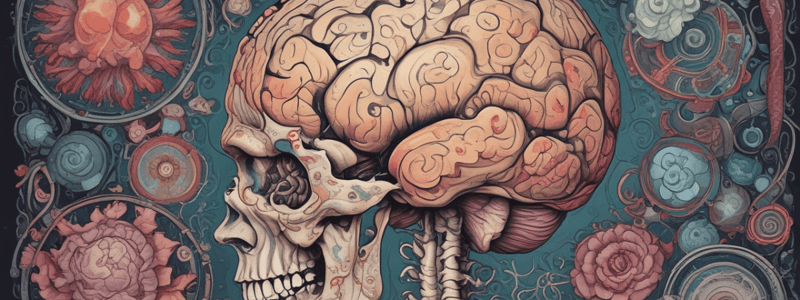Podcast
Questions and Answers
In IDH-mutant and 1p/19q-codeleted oligodendrogliomas, what is associated with shorter PFS and OS?
In IDH-mutant and 1p/19q-codeleted oligodendrogliomas, what is associated with shorter PFS and OS?
- Low mitotic count (< 2.5 mitoses/mm^2^)
- Presence of necrosis
- High mitotic count (≥ 2.5 mitoses/mm^2^) (correct)
- Absence of microvascular proliferation
What is a significant prognostic factor in cases lacking CDKN2A homozygous deletion?
What is a significant prognostic factor in cases lacking CDKN2A homozygous deletion?
- High mitotic count
- Microvascular proliferation and/or necrosis (correct)
- 1p/19q codeletion
- IDH mutation
What is an independent predictor of survival for patients with oligodendroglial tumours in older studies?
What is an independent predictor of survival for patients with oligodendroglial tumours in older studies?
- Mitotic count
- CNS WHO grade (correct)
- IDH mutation
- 1p/19q codeletion
In patients with gliomas with concurrent IDH mutation and TERT promoter mutation, what is associated with longer survival times?
In patients with gliomas with concurrent IDH mutation and TERT promoter mutation, what is associated with longer survival times?
What is associated with shorter OS in patients with IDH-mutant and 1p/19q-codeleted oligodendrogliomas?
What is associated with shorter OS in patients with IDH-mutant and 1p/19q-codeleted oligodendrogliomas?
What percentage of older histological series correspond to IDH-mutant and 1p/19q-codeleted oligodendrogliomas?
What percentage of older histological series correspond to IDH-mutant and 1p/19q-codeleted oligodendrogliomas?
What is the median survival time of patients with CNS WHO grade 3 IDH-mutant and 1p/19q-codeleted oligodendroglioma treated with radiotherapy and PCV chemotherapy?
What is the median survival time of patients with CNS WHO grade 3 IDH-mutant and 1p/19q-codeleted oligodendroglioma treated with radiotherapy and PCV chemotherapy?
What is the typical pattern of recurrence in oligodendrogliomas?
What is the typical pattern of recurrence in oligodendrogliomas?
What is a clinical factor associated with a more favourable outcome in oligodendroglioma?
What is a clinical factor associated with a more favourable outcome in oligodendroglioma?
What is the significance of IDH mutation and 1p/19q codeletion in oligodendrogliomas?
What is the significance of IDH mutation and 1p/19q codeletion in oligodendrogliomas?
What is the characteristic of malignant progression in oligodendroglioma compared to IDH-mutant astrocytoma?
What is the characteristic of malignant progression in oligodendroglioma compared to IDH-mutant astrocytoma?
What is the predictive value of higher tumour mutation burden in patients with IDH-mutant gliomas?
What is the predictive value of higher tumour mutation burden in patients with IDH-mutant gliomas?
Which genetic mutation is associated with poor prognosis in oligodendrogliomas?
Which genetic mutation is associated with poor prognosis in oligodendrogliomas?
What is the impact of CDK4 amplification on outcome in oligodendrogliomas?
What is the impact of CDK4 amplification on outcome in oligodendrogliomas?
What is the typical treatment approach for patients with IDH-mutant and 1p/19q-codeleted oligodendrogliomas of CNS WHO grade 2?
What is the typical treatment approach for patients with IDH-mutant and 1p/19q-codeleted oligodendrogliomas of CNS WHO grade 2?
What is the outcome of the EORTC 22845 trial in patients with progressive CNS WHO grade 2 gliomas?
What is the outcome of the EORTC 22845 trial in patients with progressive CNS WHO grade 2 gliomas?
What is the benefit of radiotherapy plus PCV chemotherapy in patients with CNS WHO grade 3 oligodendrogliomas?
What is the benefit of radiotherapy plus PCV chemotherapy in patients with CNS WHO grade 3 oligodendrogliomas?
What is the genetic hallmark of oligodendrogliomas?
What is the genetic hallmark of oligodendrogliomas?
What is the primary concern with therapy in patients with IDH-mutant oligodendrogliomas?
What is the primary concern with therapy in patients with IDH-mutant oligodendrogliomas?
What is associated with shorter PFS and OS in IDH-mutant and 1p/19q-codeleted CNS WHO grade 3 oligodendrogliomas?
What is associated with shorter PFS and OS in IDH-mutant and 1p/19q-codeleted CNS WHO grade 3 oligodendrogliomas?
In cases lacking CDKN2A homozygous deletion, what is of prognostic significance?
In cases lacking CDKN2A homozygous deletion, what is of prognostic significance?
What is associated with longer survival times in patients with gliomas with concurrent IDH mutation and TERT promoter mutation?
What is associated with longer survival times in patients with gliomas with concurrent IDH mutation and TERT promoter mutation?
What is an independent predictor of survival for patients with oligodendroglial tumors in older studies?
What is an independent predictor of survival for patients with oligodendroglial tumors in older studies?
In patients with IDH-mutant and 1p/19q-codeleted oligodendrogliomas, what is associated with shorter OS?
In patients with IDH-mutant and 1p/19q-codeleted oligodendrogliomas, what is associated with shorter OS?
What is the significance of CNS WHO grade in patients with IDH-mutant and 1p/19q-codeleted oligodendrogliomas?
What is the significance of CNS WHO grade in patients with IDH-mutant and 1p/19q-codeleted oligodendrogliomas?
What is associated with favourable response to therapy and median survival times of > 10 years in oligodendrogliomas?
What is associated with favourable response to therapy and median survival times of > 10 years in oligodendrogliomas?
What is the characteristic pattern of recurrence in oligodendrogliomas?
What is the characteristic pattern of recurrence in oligodendrogliomas?
What is a clinical factor associated with a more favourable outcome in oligodendrogliomas?
What is a clinical factor associated with a more favourable outcome in oligodendrogliomas?
What is the significance of IDH mutation and 1p/19q codeletion in oligodendrogliomas?
What is the significance of IDH mutation and 1p/19q codeletion in oligodendrogliomas?
What percentage of older histological series correspond to IDH-mutant and 1p/19q-codeleted oligodendrogliomas?
What percentage of older histological series correspond to IDH-mutant and 1p/19q-codeleted oligodendrogliomas?
How does the malignant progression in oligodendrogliomas compare to IDH-mutant astrocytoma?
How does the malignant progression in oligodendrogliomas compare to IDH-mutant astrocytoma?
What is associated with shorter survival in patients with IDH-mutant gliomas, including oligodendrogliomas?
What is associated with shorter survival in patients with IDH-mutant gliomas, including oligodendrogliomas?
What is the significance of CIC mutation in oligodendrogliomas?
What is the significance of CIC mutation in oligodendrogliomas?
What is the typical treatment approach for patients with IDH-mutant and 1p/19q-codeleted oligodendrogliomas of CNS WHO grade 2?
What is the typical treatment approach for patients with IDH-mutant and 1p/19q-codeleted oligodendrogliomas of CNS WHO grade 2?
What is the outcome of the EORTC 22845 trial in patients with progressive CNS WHO grade 2 gliomas?
What is the outcome of the EORTC 22845 trial in patients with progressive CNS WHO grade 2 gliomas?
What is the benefit of radiotherapy plus PCV chemotherapy in patients with CNS WHO grade 3 oligodendrogliomas?
What is the benefit of radiotherapy plus PCV chemotherapy in patients with CNS WHO grade 3 oligodendrogliomas?
What is the primary concern with therapy in patients with IDH-mutant oligodendrogliomas?
What is the primary concern with therapy in patients with IDH-mutant oligodendrogliomas?
What is the impact of RB1 homozygous deletion on outcome in oligodendrogliomas?
What is the impact of RB1 homozygous deletion on outcome in oligodendrogliomas?
Study Notes
Staging and Prognosis
- IDH-mutant and 1p/19q-codeleted oligodendrogliomas are associated with favourable response to therapy and median survival times of > 10 years.
- Patients with CNS WHO grade 3 IDH-mutant and 1p/19q-codeleted oligodendroglioma who participated in prospective clinical trials and were treated with a combination of radiotherapy and procarbazine, lomustine, and vincristine (PCV) chemotherapy showed a median survival of ≥ 14 years.
Prognostic Factors
- Younger patient age at diagnosis, frontal lobe location, presentation with seizures, high postoperative Karnofsky score, and macroscopically complete surgical removal are associated with a more favourable outcome.
- High mitotic count (≥ 2.5 mitoses/mm^2) is linked to shorter PFS and OS in IDH-mutant and 1p/19q-codeleted CNS WHO grade 3 oligodendrogliomas.
- The presence of microvascular proliferation and/or necrosis is of prognostic significance in cases lacking CDKN2A homozygous deletion.
CNS WHO Grading
- Older studies reported CNS WHO grade as an independent predictor of survival for patients with oligodendroglial tumours.
- Recent studies have shown that patients with grade 2 tumours had longer survival times than those with grade 3 tumours.
Treatment
- The optimal postoperative treatment of patients with IDH-mutant and 1p/19q-codeleted oligodendrogliomas of CNS WHO grade 2 is a matter of ongoing discussion.
- Radiotherapy and chemotherapy are often deferred until tumour progression in patients with CNS WHO grade 2 tumours.
- Patients with symptomatic and progressive tumours, with CNS WHO grade 3 tumours, or with large residual tumours after surgery usually receive immediate further treatment with radiotherapy and/or chemotherapy.
- Adjuvant radiotherapy prolonged PFS but not OS in patients with progressive CNS WHO grade 2 gliomas.
- Long-term follow-up data from randomized trials showed a major increase in OS after radiotherapy plus PCV chemotherapy in patients with CNS WHO grade 3 oligodendrogliomas.
Staging and Prognosis
- IDH-mutant and 1p/19q-codeleted oligodendrogliomas are associated with favourable response to therapy and median survival times of > 10 years.
- Patients with CNS WHO grade 3 IDH-mutant and 1p/19q-codeleted oligodendroglioma who participated in prospective clinical trials and were treated with a combination of radiotherapy and procarbazine, lomustine, and vincristine (PCV) chemotherapy showed a median survival of ≥ 14 years.
Prognostic Factors
- Younger patient age at diagnosis, frontal lobe location, presentation with seizures, high postoperative Karnofsky score, and macroscopically complete surgical removal are associated with a more favourable outcome.
- High mitotic count (≥ 2.5 mitoses/mm^2) is linked to shorter PFS and OS in IDH-mutant and 1p/19q-codeleted CNS WHO grade 3 oligodendrogliomas.
- The presence of microvascular proliferation and/or necrosis is of prognostic significance in cases lacking CDKN2A homozygous deletion.
CNS WHO Grading
- Older studies reported CNS WHO grade as an independent predictor of survival for patients with oligodendroglial tumours.
- Recent studies have shown that patients with grade 2 tumours had longer survival times than those with grade 3 tumours.
Treatment
- The optimal postoperative treatment of patients with IDH-mutant and 1p/19q-codeleted oligodendrogliomas of CNS WHO grade 2 is a matter of ongoing discussion.
- Radiotherapy and chemotherapy are often deferred until tumour progression in patients with CNS WHO grade 2 tumours.
- Patients with symptomatic and progressive tumours, with CNS WHO grade 3 tumours, or with large residual tumours after surgery usually receive immediate further treatment with radiotherapy and/or chemotherapy.
- Adjuvant radiotherapy prolonged PFS but not OS in patients with progressive CNS WHO grade 2 gliomas.
- Long-term follow-up data from randomized trials showed a major increase in OS after radiotherapy plus PCV chemotherapy in patients with CNS WHO grade 3 oligodendrogliomas.
Studying That Suits You
Use AI to generate personalized quizzes and flashcards to suit your learning preferences.
Related Documents
Description
This quiz covers the essential and desirable diagnostic criteria for gliomas, as well as prognosis and prediction based on survival data and molecular stratification.




